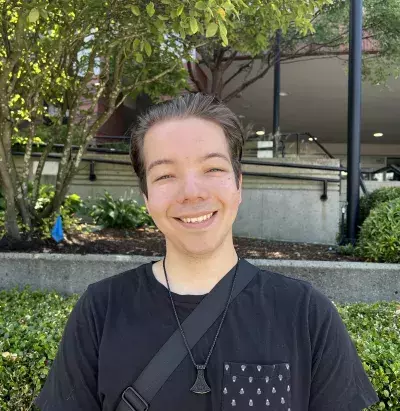Transgender individuals tend to have higher levels of relationship satisfaction than cisgender individuals, a Kwantlen Polytechnic University (KPU) researcher has found.
Misha Turychenko, a Bachelor of Arts in Psychology honours student, has always been fascinated by the science of what makes a relationship work well. And when it came down to choosing an honours thesis topic, he knew just what he wanted to explore.

“There’s a significant lack of research on transgender individuals in relationships,” he says. “I wanted to help fill this gap and learn how they might compare to cisgender individuals in areas like relationship satisfaction and conflict resolution.”
Turychenko employed an online questionnaire designed to evaluate levels of general everyday stress, gender-related stress, relationship satisfaction and conflict resolution styles. This survey, which was open to both transgender and cisgender individuals who are currently in a committed romantic relationship, generated results from over 400 participants.
The study found that transgender individuals reported having higher levels of satisfaction with both their partners and their relationships overall.
“One thing I found especially interesting was that transgender people who are less connected to their wider community actually felt a greater sense of relationship satisfaction,” says Turychenko. “You would typically think it would go the other way around, but perhaps they may depend more on their partners for social support and therefore view them more positively.”
Both groups also differed in terms of conflict resolution, with transgender individuals reportedly engaging in more positive forms of problem solving. Transgender individuals also reported being less likely to resort to ineffective arguing methods, such as physical altercations, verbal insults and avoiding arguments altogether.
One reason cisgender individuals may report lower levels of relationship satisfaction, Turychenko says, could be due to the increased external pressure they face from friends and family to remain in unhealthy relationships, which is something transgender individuals don’t experience as much.
He says cisgender couples may also tend to reflect traditional gender roles and hierarchy, which can be a source of tension in relationships. Couples where at least one partner is transgender are less likely to have similar tensions due to having more of an equal standing in relationships, he adds.
“I really hope to see more studies on this topic, especially headed by transgender researchers,” says Turychenko. “Research like this is important because it can help inform advocacy efforts on developing policies and counselling methods that are better suited for transgender individuals.”
Turychenko thanks his research supervisor Dr. Cory L. Pedersen and his fellow students for their support and guidance. He also credits KPU’s honours program and the Student Research and Innovation Grant for helping make this research possible.
“KPU’s psychology honours program is a great opportunity to take on solo research from start to finish. You really get a thorough understanding of all the steps that go into making a study. I’m looking forward to doing more research, either on this topic or another, and this experience has really prepared me for that.”